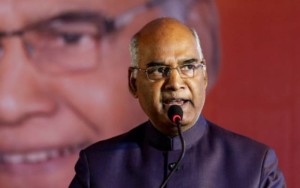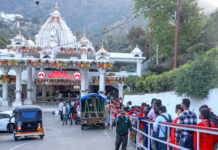
NEW DELHI: President Ram Nath Kovind has stressed that inadequate last-mile connectivity and exhibition of the history of the rich Buddhist circuit in India are bottlenecks that need to be overcome so that this special sector of heritage tourism realizes its full potential.
Inaugurating the 6th International Buddhist Conclave here, he said the Buddhist circuit in India is an important and revered set of destinations for the approximately 500 million-strong community of Buddhists that lives across Asia and other parts of the world.
“I must emphasize that while we should take advantage of our strengths, we also need to overcome issues that are limiting us from scaling up. There are issues related to limited market research, limited interpretation, and inadequate exhibiting and presentation of the Buddhist circuit’s history and narrative.
“While air services have expanded in the past few years, last-mile connectivity, whether by way of road and rail, still has gaps that need to be filled. Pollution and environmental changes are other pressing concerns,” the President said at the event being organized by the Tourism ministry.
He said despite these “niggling problems”, the potential in this domain is so large that it can only motivate us to move ahead with greater energy and vigor.
“I am confident that the combined expertise of the delegates at this conclave, drawing inspiration from the wisdom and the problem-solving techniques of Lord Buddha will lead our heritage tourism efforts to a more enlightened path,” he said to the delegates who have converged here from about 30 countries.
The President also launched a website (www.indiathelandofbuddha.in) and a film dedicated to the Buddhist circuit in the country that he said was aimed “to facilitate travel and pilgrimage” at these locations for both domestic and international tourists and pilgrims.
Talking about the pilgrimage to these locations, Kovind said the practice of cultural and religious travel and tourism is not new to India.
“It goes back thousands of years and in fact visits from Buddhist pilgrims, monks and scholars from other countries and civilizations have been a proud feature of our history. This has been mutually enriching and in diverse ways.
“The voyage of Buddhism from India to Asia and the trans-continental links that were created carried more than just spiritualism. They carried a rich cargo of knowledge and learning. They carried arts and crafts. They carried meditation techniques and even martial arts,” he said.
Eventually, the President said, the many roads that the monks and nuns- those men and women of faith – carved out became among the earliest trade routes.
“In that sense, Buddhism was the basis for an early form of globalization and of inter-connectedness in our continent. It is these principles and values that must continue to guide us,” he said.
The president informed the delegates that many steps have been taken by the government to boost tourism as also the Buddhist circuit in the country.
“The introduction and expansion of the e-visa scheme, which is an initiative of this government, facilitates among others those tourists coming to experience India’s Buddhist legacy. The government is also making earnest efforts to develop Buddhist heritage sites as even more welcoming destinations.
“I understand the Ministry of Tourism has identified the Buddhist circuit as one of the thematic circuits for development under its ‘Swadesh Darshan’ scheme.
“Five projects, with a combined outlay of more than Rs 350 crore, have been sanctioned for the states of Andhra Pradesh, Bihar, Gujarat, Madhya Pradesh and Uttar Pradesh,” he said.
He asked all the stakeholders in this domain to join hands and ensure a good environment for the visitors of the circuit.
“It goes without saying that the government cannot do everything on its own. Tourism is a multi-stakeholder enterprise. The private sector and civil society have substantial roles. And in terms of providing a safe and secure visitor experience, state and municipal administrations play a critical part,” he said.
In its essence, tourism, like Buddhism, is about people and empowering them to realize their potential, he said.PTI







